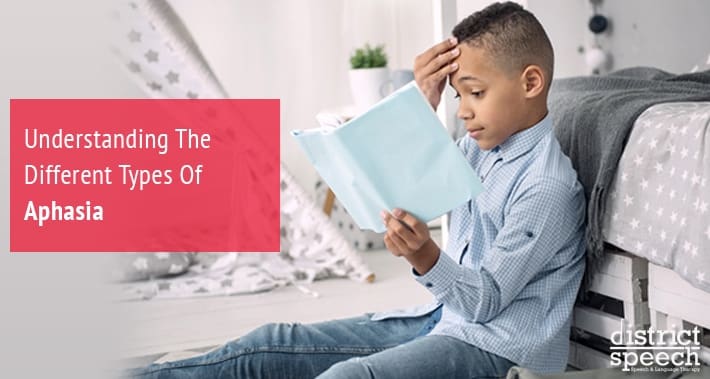
Losing your language abilities can be scary, whether it happens gradually or suddenly.
That’s the case with aphasia, which can happen from a stroke or other brain injury.
If you have recently experienced a stroke, speech therapy for stroke recovery can help restore or improve your communication abilities.
Even if it has been a while since your injury or illness, speech therapy for aphasia can help you learn new communication skills and strategies.
But today, we’re going to take a closer look at aphasia, the different types of it, and how a Washington DC speech therapist can help.
What Is Aphasia?
Aphasia is an impairment that affects your language and communication skills.
Aphasia is always the result of an injury to the brain.
Most commonly, brain injuries that lead to aphasia are the result of a stroke.
It can also be caused by traumatic brain injury, infection, or brain tumor.
This is why many people who have had a stroke mix up words, have slurred speech, or lose the ability to communicate in words.
Aphasia shows up a little differently in each person.
It can vary in terms of severity and symptoms.
Some people experience mild aphasia, some severe.
You might have difficulties with only one form of communication.
In someone else, aphasia might impact speech, comprehension, and abilities to read and write.
RELATED: How To Communicate With An Adult With Aphasia
What Are The Different Types Of Aphasia?
There are many types of aphasia – this article discusses a few common types.
Each type can refer to different impacts and symptoms.
Some of the distinctions have to do with language skills and speech abilities.
Expressive And Receptive Aphasia
Expressive language skills are skills you use to speak and express yourself in writing.
Expressive aphasia refers to difficulty speaking and writing.
Receptive language skills are skills you use to understand language like speech or written words.
Receptive aphasia refers to difficulty reading and understanding speech.
RELATED: Can Speech Therapy Help With Expressive And Receptive Language Disorders?
Fluent And Non Fluent Aphasia
You might have heard of fluency before in terms of how well you can speak a language.
But in the world of speech therapy, we use it differently.
Fluent and non fluent refers to your ability to string words together grammatically when speaking or writing.
If you are fluent, you can form complete sentences.
If you are non fluent, it might be difficult to put words together in a sentence.
You may only be able to call up a few words at one time.
Global Aphasia
Global aphasia affects the full range of language and communication skills.
Global aphasia is caused by multiple injuries to the brain’s language processing centers.
Global aphasia is often present after a stroke or a serious brain injury.
If someone you love has global aphasia, they can likely understand none or very little of what is said to them.
They may find it challenging to form sounds and only be able to form a few recognizable words.
Many people who have global aphasia still have full cognitive and intellectual abilities.
Your loved one may seem frustrated or depressed and may act out if they are unable to make themselves understood.
As the brain heals from an injury, global aphasia may improve, but some effects of the injury may not go away.
Global aphasia is considered the most severe form of aphasia.
Wernicke’s Aphasia
Wernicke’s aphasia is also known as receptive aphasia or fluent aphasia.
If your loved one has Wernicke’s aphasia, they have impaired receptive communication.
In other words, they have limited, lost, or declining ability to understand what they hear.
They may be considered ‘fluent’ because they can speak and string words together.
But the words they string together may not make sense in context, and they may not realize they are using incorrect words.
Your loved one may speak to you, but you may not be able to make sense of what they want to communicate.
In most cases, if your loved one has Wernicke’s aphasia they will have difficulty reading and writing.

Broca’s Aphasia
If your loved one has Broca’s aphasia, they might still speak a little.
Their speech might seem halting or challenging, and they may only be able to get a few words out at a time.
They may also have limited ability to express themselves in writing.
They will still be able to understand what they hear and will still be able to read.
Anomic Aphasia
Anomia is what happens when you can’t find the word you’re looking for.
A diagnosis of anomic aphasia means your loved one finds it challenging to come up with the right words.
They are fluent, meaning they can form words and put them together grammatically.
But their speech might seem vague or like they are grasping for something.
They might also have difficulty finding the right words when writing.
Mixed Non Fluent Aphasia
Mixed non fluent aphasia involves limited and halting speech.
In this way, the symptoms of mixed non fluent aphasia resemble the symptoms of Broca’s aphasia.
Unlike Broca’s, if your loved one has mixed non fluent aphasia, they will also have some difficulty understanding.
They may still be able to read and write, but their abilities will be limited to an elementary school level.
Primary Progressive Aphasia
If you or your loved one has primary progressive aphasia (PPA), you can expect gradual loss of language skills over time.
PPA is most often caused by degenerative disorders that affect the brain – Alzheimer’s disease, for example.
As the cells in the brain’s language centers deteriorate, you or your loved one will lose skills in all areas of communication.
Many degenerative disorders affect multiple parts of the brain at once, so PPA may be accompanied by dementia or memory loss.
Book Your Appointment With District Speech Today
Changes in language abilities after a stroke, brain injury, illness, or tumor can be a major adjustment.
Speech therapy can help you or your loved one strengthen the brain’s language centers or find new ways to communicate.
To start rebuilding new language and communication skills book your appointment with District Speech today.
1300 I St NW, Suite 400 E,
Washington, DC 20005
- https://g.page/districtspeech
District Speech and Language Therapy specializes in speech therapy, physical therapy, and occupational therapy solutions, for both children and adults, in the Washington D.C and the Arlington Virginia areas.